Retiring Arista CEO David Massey Shares His Top 10 Career Highlights: Oasis, Shawn Mendes, Shakira and More
This coming Monday (June 30), Arista Records president/CEO David Massey will retire from the Sony imprint he relaunched seven years ago, concluding a career of more than four decades in the music industry spanning generations, genres and continents.
Over the past 40 years, the Brit has gone from London to New York worked with artists who have changed the culture like Shakira and Oasis, expanded the parameters of boy bands such as Jonas Brothers and released music that became an anthem for an era with JP Saxe’s pandemic smash, “If the World Was Ending,” featuring Julia Michaels.
An extremely abbreviated list of the other acts he has worked with includes Good Charlotte, Avicii, Shawn Mendes, Demi Lovato, The Killers, Fall Out Boy, Bon Jovi, Duffy, Neon Trees and Måneskin.
After starting as an artist manager in London, Massey, who has a Master of Law degree from Cambridge University, moved to New York, which he has called home for more than 30 years. His career has spanned several labels, including Sony’s Epic, where he was executive vp/general manager and executive vp of A&R, as well as president of his own Sony-distributed Daylight Records imprint. He also had stints as president of Mercury Records and president/CEO of Island before returning to Sony to run Arista and a publishing and management joint venture with Sony.
No matter the title, Massey has been, above all else, an A&R executive, deeply entrenched in the magic of making music. Many of his top memories, as recounted below, revolve around the thrill of the first time he heard a song that took an act — and transported the listener — to a new level. “The greatest things in my career have been being united with the artist. It’s never just about me,” Massey says, sitting in his cozy office in Sony’s New York headquarters. “It’s the collaboration that has been so magical between me and an artist.”
He leaves Arista in competent and familiar hands: his daughter Clio Massey and Matt D’Arduini, both of whom have been with the revitalized Arista and/or [publishing company] Work of Art since their inception, will succeed Massey as co-presidents and report to Sony Music Group chairman Rob Stringer.
Massey is looking forward to seeing his daughter outside of work. “I’m really excited to have my first summer off in 45 years and to have some freedom and some time for myself and my family,” he says. But he’s not going away for long: “I want to participate in the business in different ways, for sure, and give back in any way I can.”
His first move after he’s official retired? Going to see Oasis on the opening night of Noel and Liam Gallagher’s reunion tour in Cardiff, Wales on July 4.
Exclusively for Billboard, Massey picked out 10 career highlights, often within the context of his executive moves, from a run that has more than he could mention. Below are his picks, in his own words, edited for brevity and clarity.
Early Management Days with Wang Chung
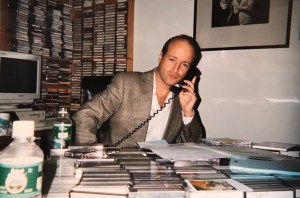
David Massey, circa 1980s
Gaby Massey
It’s 1982, I’m about 23 and still living in the U.K. and I’ve started managing Wang Chung (who had been dropped from Arista). My dream was to get them signed by David Geffen because the Geffen label had Neil Young, Joni Mitchell, Elton John and Donna Summer and no baby acts. I had so much admiration for him from when he was the manager for Laura Nyro. When I was 11, her Eli and the Thirteenth Confession was the first album I ever bought. I had a demo of a Wang Chung song called “Dance Hall Days” and I brought it to America. I’d never been to L.A. before. [Labels] were interested in the band, thank God, because not one single label in England wanted them. I got five other offers, but I had my heart set on Geffen and, unfortunately, they said, “We need to hear three more songs before we commit. It is our first baby band and we need to be sure.”
I went back to London and told the band they’ve got to do three more demos and we sent those in. It was about a month later and, for the only time ever, I had invited the band over with their girlfriends for dinner. I remember making dinner and saying to my girlfriend, “What have I done? I haven’t taken any of the offers. I haven’t heard from Geffen in a month. I’ve got two weeks left of salary and then I’m out of money.” We all sat down. The phone rang and it was David Geffen, who said, “I’m signing the band.”
Oasis
It’s summer 1993. I’d moved to New York, and I was vp of A&R at Epic. Alan McGee, head of Creation, played me four or five different artists from the UK, [who] were not right for America. But then he said, “I was in Manchester [England] a couple of days ago, and this band basically stormed the stage uninvited and played, and there’s something about them. Can I play you their first demo?” I will never forget this moment. He played me the demo of a track called “Columbia,” which was nearly half instrumental and it was the most extraordinary thing. I was like, “I have to have this band.” I remember going to find my boss, Richard Griffiths, and pulling him out of the bathroom to get him to listen to “Columbia.” And that was the beginning of the whole Oasis journey.
I worked with Liam and Noel [Gallagher] for all the albums that they had on Sony, and I never had a cross word with them. The musical journey was like no other. In England, it exploded, and they headlined Glastonbury in ‘95. At about seven [the next] morning, myself, Noel and his girlfriend, Meg, and [the band’s manager] Marcus Russell drove back to London. Noel was sitting in the back, dark glasses on, and said, “I’m gonna play you the demos to my new album.” He played me the demos to (What’s the Story) Morning Glory in the order in which they ended up coming out on the album. I have never felt anything like it. When it got to “Wonderwall,” he turned around to me and goes, “Are you f–king crying?” Because I was, slightly.
It’s the only time in my career, either before or after, where I turned to [an artist] and I said, “The only thing I can tell you is I promise you you will do more than 10 million albums on this record.” This is the most important album that I will ever be involved in. Just imagine listening to the demos of “Champagne Supernova,” “Wonderwall,” “Hello,” “Morning Glory,” “Don’t Look Back in Anger” … It was all there. It was all there in that one journey back from Glastonbury back to London. It was a game-changing moment.
Launching Daylight and Good Charlotte
In 1999, Sony allowed me to start my own label, Daylight. I got hit by a car in November of 1999 by a 93-year-old driver and broke both my legs in London. I come back to New York in a wheelchair. On Valentine’s Day, 2000, it really hurt, but they let me stand up for the first time. That night, I went to see a band on my little crutches, and it was Good Charlotte. Being an identical twin myself, the twins walked up to me after the show and I pointed at Benji [Madden], and I said, “You’re the oldest, probably by about five minutes,” which was exactly the case because I’m the youngest by five minutes. And that was how I met Good Charlotte — on my crutches. Anastasia was my first signing, then Good Charlotte, then the Jonas Brothers. Delta Goodrum was an international signing. I did an album with Cyndi Lauper and Phantom Planet. We sold like 30 million albums in four years with only three members of staff.
The Jonas Brothers
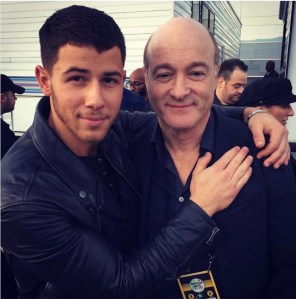
Nick Jonas and David Massey
Lauren Schneider
I signed Nick Jonas in 2003 before I signed the other brothers. The head of international at Sony was this amazing guy called Bob Bowlin. He said to me, “Can I ask you a favor? My pastor in Wyckoff, New Jersey has got this 10-year-old son that he thinks is really talented. Would you be willing to meet him?” He’d already done two things on Broadway, including Les Miz. I meet Nick and was fascinated by him. He was so mature, and he sung so great. I signed him on the spot.
We were doing a Christian album as Nicholas Jonas and he says, ”I’d like you to meet my brothers.” Joe and Kevin Jr. come in and I’m blown away by them. The three of them stood up in a semi-circle and sang me a song called, “Please Be Mine.” I’m like, “Holy sh-t. I think I should sign the two brothers, too. We should do some songs as the Jonas Brothers, and we’ll also do Nicholas Jonas.” That’s how the Jonas Brothers began, effortlessly. Daylight had the right to place records on either Epic or Columbia, and we chose Columbia for Nick and then the Jonas Brothers also went with Columbia.
Shakira
Around 2004 or 2005, I get asked to be involved in the A&R for Shakira, who was one of the most impressive people I’ve ever known in the business, an extraordinary human being. We were trying to find a single and we got Wyclef [Jean] involved, who did an unbelievable job with her. She called me one evening and said, “People tell me this isn’t English, but can I say, ‘My hips don’t lie’?” And I’m like, “Absof–kinglutely.”
We were up till all hours of the night recording, and there was magic in the air. There’s a hook in the song from Wyclef that goes, “Shakira, Shakira.” I’m sitting on the window ledge talking to Shakira and there’s all these scented candles around. I’m gesticulating and a little bit of my sleeve catches fire and it makes a hole. The next day, I’m in my office, and someone comes in with a gift from Shakira, which is the exact same teal Polo turtleneck that somehow they have found. I didn’t tell her where I bought it, which was this really obscure shop on Madison Avenue. I had to go pick her up to take her to an MTV event and I knocked on her door, and I [sung], “Shakira, Shakira. We’ve got a No. 1.”
You just knew from that hook that was just going to be a thing. That was a real highlight, working with her. She speaks seven languages fluently. She could run a country, that woman. She is luminous.
The Killers
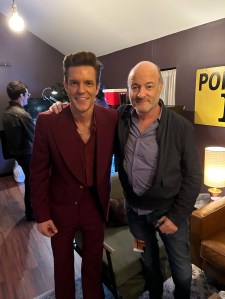
The Killers’ Brandon Flowers and David Massey
Matt DArduini
I joined Island Def Jam in April 2007 to be president of Mercury, as a startup. We signed Duffy and Neon Trees and were beginning to formulate a real label. And at the end of 2007, a lot of people left Island Def Jam and [chairman/CEO] L.A. Reid tells me, “I need you to A&R The Killers and Fall Out Boy.” I say, “I’ve never met them,” and he goes, “Well, figure it out. You’re president.”
I have always worshiped both those bands. I meet [Killers lead singer] Brandon Flowers in a parking lot in Las Vegas. He’s got his new baby with him in a pram. Robert Reynolds, the manager, plays me the demo in his car of a song called “Human.” [Producer] Stuart Price came in and they turned that song into the biggest hit The Killers have ever had other than “Mr. Brightside,” but it was much, much bigger in Europe. What Stuart Price did in the studio is one of the most exciting events I’ve ever witnessed in terms of the development of a raw song into a full-blown record. It was my first involvement with them as an A&R guy. No credit to me, it’s all about Stuart Price, but it was just a great thing to witness.
Avicii
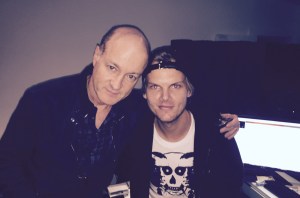
David Massey and Avicii
Matt D’Arduini
In 2013, I’d just become president of Island. Tim Bergling [Avicii] had “Wake Me Up.” He’s the single shyest person that I’ve ever met, along with [Måneskin’s] Damiano [David] and Brandon Flowers. Tim was an intensely brilliant young man and so innovative. He was underrated in terms of what he actually did in the studio.
I was a trustee at the [Recording Academy] and in three-day [Trustee] meetings. It was the night of the American Music Awards. I suddenly realized Tim was nominated [for favorite electronic dance music artist], and I knew there’d be no one with him. I said to [then Recording Academy CEO] Neil Portnow, “I’ve got to go to the AMAs, because that kid will be sitting there alone. Maybe with a girlfriend, but no publicist or manager, and he’s never been to an award show in his life.” Rihanna makes this amazing speech, and he’s like, “God, that was amazing. I’ve never spoken in public,” and I said, “Tim, if you win, you’re going to have to go up there.” He said, “I’m not going up there.” I’m like, “Tim, if you win, you can just look at me and you thank your fans, your label and your manager and just get off stage.” And he won. He did a beautiful job, but it was such an emotional thing.
Shawn Mendes
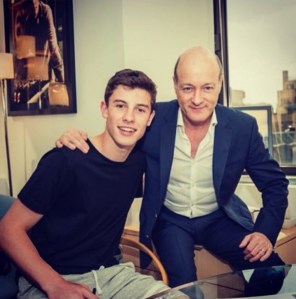
Shawn Mendes and David Massey
Lauren Schneider
March of 2014, I was president of Island and about to be made CEO and president on April 1, when I meet Shawn. [A&R executive] Ziggy Chareton had identified this young artist from Toronto who’s got a following on Vine. I meet this 15-year-old kid who doesn’t yet have songs, but in order to connect with me, he plays “Wonderwall” on guitar because he knows my history with Oasis. There is something about his energy and his charisma that you just know that he could be a global star with the right opportunity.
It was a very competitive situation to get him to choose Island. Just as we were signing him, two things happened that were really interesting and very much highlights for me. At the signing, he takes a picture of us for his Instagram. I didn’t have an Instagram account or really know much about it. We come back from a cup of tea 20 minutes later and there’s 156,000 likes on the picture. I’m like, “Shawn, if there’s 156,000 kids who in 20 minutes [like this], we should release a song, because how do we know that 156,000 of them won’t download it on the first day? Why don’t we teach them that you’re a real artist?”
That same day, a young writer called Ido Zmishlany had played me a song called “Life of the Party,” which [Shawn recorded]. I said, “We can put it out on iTunes as a first introduction into you for your fans. Let’s tease it for three weeks.” We did a digital marketing campaign for three weeks, which at that time was a very unusual thing. Three weeks later, we put out “Life of the Party.” Within five minutes of it being released at midnight, it was No. 1 on the iTunes chart, and by six in the morning, we’ve done 60,000 downloads. The first week, he did 160,000. The whole world was like, “Who on earth is Shawn Mendes?” No one had heard of him outside of Vine. Then “Stitches” came along and “Treat You Better,” but it started with that moment.
Demi Lovato
When I became CEO [of Island] on April 1, 2014, [UMG Chairman/CEO] Lucian [Grainge] separated Island from Def Jam, and we became standalone. Things just took on a whole other dimension having our own thing. We had had a lot of success with bringing Nick Jonas back with “Jealous” and “Chains.” Phil McIntyre, who managed Nick, asked me to look into working with Demi, who I’d always been a fan of.
We created a joint venture with Disney, which was a very unusual thing to do. We had huge success with “Confident” and “Cool for the Summer,” and it was an amazingly fantastic journey. Max Martin and Savan Kotecha were totally involved in this. Then we did some work with Oak Felder for the second album. There were about 12 of us in the meeting — management, other A&R people, Island people — playing various songs that could be potential singles.
Demi was sitting on my right, and we play a song that everyone says is not appropriate. It sounds too cocky and arrogant. And me and Demi were like, “That is the single.” And it was “Sorry Not Sorry,” which was her biggest single. One of my favorite things with her is that we just seemed to agree on singles in such a great way, and we had an amazing journey together until I left. “Sorry Not Sorry” was just me and her kind of against the world.
Rebirth of Arista and Maneskin
After I’d already decided that I was going to move on from Island, Rob [Stringer] and I had dinner and we talked about a new label, management and publishing company. I thought, “Wouldn’t it be amazing to use a brand like Arista that’s been dormant for 12 years?” I asked Rob to ask [Arista founder] Clive [Davis] if he would be amenable to that, and Clive was so supportive.
One of the first signings was a young artist called JP Saxe. The first song I ever heard from him was called “The Few Things,” which was one of the most beautiful songs I’ve ever heard. We signed him to Arista, but also to Work of Art [publishing company]. Within a few weeks, he got into a demo session with [songwriter] Julia Michaels and that first day, they wrote a song called “If the World Was Ending.” I got the demo at seven o’clock the next morning, and I remember hearing that line, “If the world was ending, you’d come over, right? You’d spend the night.” And I felt that was going to be a thing.
We released it at the end of November of 2019, and it got an amazing response from the artist community. Then when the pandemic hit, it became the anthem of the pandemic. And that was really our first breakthrough. It’s at 1.8 billion streams on Spotify.
I think the swan song for my era of Arista was meeting Måneskin in the pandemic, hearing them on Eurovision and asking if they could sing in English. When I found out they had some English demos, I flew to Rome to meet them and absolutely fell in love with these kids. They had [global hit] “Beggin’.” There’s never been an Italian rock band blowing up worldwide and getting nominated for a Grammy for best new artist and being on SNL and selling out Madison Square Garden. And now working on Damiano’s solo project. My belief in him and in the band has definitely been the swan song of this era. Definitely.







